The Challenge
Finland-based Schneider-Electric NB (Strömfors) has developed a reputation for having the most sustainable applications in its market. While that helps differentiate the unit of Schneider Electric from competitors, it also presents an ongoing challenge for product engineers to find new ways to reduce the company’s environmental footprint – beyond what is even required by law.
When the company turned its eye on one of its most ubiquitous products – electrical junction boxes – it had a real challenge on its hands.
For electrical safety, flame retardant gaskets insulate the boxes to reduce the chance of fire caused by sparks or electrical overload. For years, manufacturers have used halogens to achieve the needed safety properties. But halogens have faced scrutiny over the last decade for far-reaching health and environmental consequences akin to those of long-banned PCBs.
As a leading producer of electrical junction boxes, Schneider-Electric wanted to replace the halogenated materials used in its gaskets. Anything they developed would have to meet the international electrical standard IEC 60670-1, which says the materials used in the wall boxes have to pass a Glow Wire Flammability Index (GWFI) 850°C testing (IEC 60695-2-12) at the application thickness, and 960°C at 2mm.
The Solution
As part of their search for a non-halogenated product, the design staff at Schneider-Electric met with Avient's GLS thermoplastic elastomer (TPE) material specialists. Their discussions led them to focus on a formulation within the OnFlex™ S HF portfolio of non-halogenated, flame retardant materials. But could it be modified to meet the application’s stringent requirements?
The engineers tested the material for shear resistance based on the thickness of the seal. It passed – performing satisfactorily at an 85 Shore A hardness level. They then modified the material to offer enough heat resistance so it could be overmolded onto polypropylene, the underlying material that provides the gaskets’ rigidity.
Finally, further modifications enabled the material to bond sufficiently and be chemically compatible with polypropylene.
In addition to passing these tests, the material offered a number of other key advantages, including:
- Easy processibility
- Abrasion resistance
- Excellent colorability, which can be achieved with pre-colored raw materials or by coloring natural grades during processing
- Retained flexibility and performance at temperatures ranging from -50° C to +100° C
- All grades meet UL94-V0 at 1.5 mm
- All grades pass IEC 60695-2-12 Glow Wire Flammability Index (GWFI) at 960°
The Impact
The new approach to making the halogen-free electric junction boxes provided several important benefits to Schneider-Electric:
- Flexibility in processing: The OnFlex S HF material can be supplied in either natural or pre-colored grades. Natural grades can be colored during processing with compatible products from Avient’s OnColor™ color concentrate line.
- Eco-friendly at competitive price: The non-halogenated solution has a density 0.4 g/cm3 less than a traditional halogenated material, and this density advantage makes it price competitive with the traditional solution.
- Overmolding capabilities: High-flow properties of OnFlex S HF TPE allow the gaskets to be overmolded in multicavity tools (up to 12 cavities per tool). The material also can be used in tools originally constructed for halogenated materials with no rework required.
Thanks to more environmentally conscious products, Schneider-Electric also expects to increase market share by as much as 20 percent – translating into a potential revenue increase of as much as $225,000. The environmental differentiation also helps defend against market incursion by low-cost competition.
By replacing a potentially harmful material, Schneider-Electric improved production efficiencies while solidifying its leadership position as an ethical, eco-friendly producer of high-quality electrical supplies.
